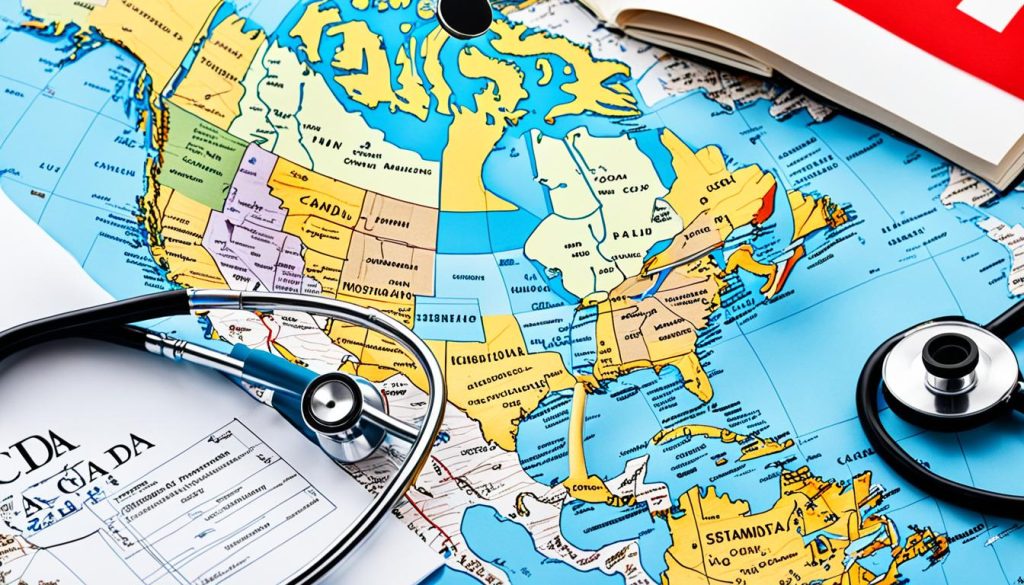Did you know that becoming a doctor in Canada typically takes at least 10 years to complete? This extensive process involves a series of critical steps, including obtaining a high school diploma, earning a bachelor’s degree, passing the Medical College Admissions Test (MCAT), enrolling in a Canadian medical school, passing the Medical Council of Canada Evaluating Examination (MCCEE), applying for residency programs, completing residency training, and obtaining the necessary provincial certifications. Each of these milestones plays a crucial role in shaping aspiring physicians for a rewarding medical career in Canada.
Aspiring medical professionals in Canada must navigate a challenging yet fulfilling path to achieving their dream of becoming a doctor. From the initial high school requirements to the final provincial certifications, the journey to becoming a physician in Canada is both demanding and rewarding. In this article, we’ll explore the detailed steps and educational milestones that individuals must achieve to enter the medical field and provide healthcare services to Canadians.
Overview of Becoming a Doctor in Canada
The path to becoming a doctor in Canada typically involves several key steps. First, aspiring physicians must obtain a high school diploma and then earn a bachelor’s degree, often in a science-related field. They must then pass the rigorous Medical College Admissions Test (MCAT) before applying to and completing a four-year medical degree program at a recognized Canadian medical school.
1. Educational Requirements
After completing their bachelor’s degree, prospective medical students in Canada must take the Medical College Admissions Test (MCAT). This standardized exam evaluates an applicant’s knowledge in areas like biology, chemistry, physics, and verbal reasoning. The MCAT is a rigorous, nine-hour test that assesses a wide range of skills essential for success in medical school.
2. Licensing and Certification
Upon graduating from medical school, prospective doctors in Canada must pass the Medical Council of Canada Evaluating Examination (MCCEE) to demonstrate their medical knowledge and competency. This licensing exam is known to be significantly more challenging than the MCAT, as it assesses a broader range of medical subjects and clinical decision-making skills.
3. Residency Training
After passing the MCCEE, the next step is to apply for residency programs in Canada through the Canadian Resident Matching Service (CaRMS). This online application system allows aspiring physicians to select the medical specialty and province where they wish to complete their residency training. Residency training typically lasts between 2 to 7 years, depending on the medical specialty, during which new physicians work under the supervision of experienced doctors, gaining hands-on experience in diagnosing and treating patients, managing medical emergencies, and developing essential clinical skills.
The process of becoming a doctor in Canada can be challenging and time-consuming, taking at least 10 years to complete. However, for those with a passion for the medical field, the rewarding nature of the profession makes the journey worthwhile. The path involves several key steps, including obtaining a high school diploma, earning a bachelor’s degree, passing the MCAT, completing medical school, passing the MCCEE, and undergoing extensive residency training.
Get a High School Diploma
The first step in becoming a doctor in Canada is to obtain a high school diploma. While you don’t necessarily need to have a specific career path in mind at this stage, it’s a good idea to consult with a guidance counsellor to ensure you are taking the necessary science and math courses that will prepare you for medical school. Gaining some early experience in healthcare settings through volunteering can also help solidify your interest in the medical field.
As you navigate your high school journey, keep in mind that Canadian doctors are generally well-paid, with the highest-paid doctors often specializing in fields like surgery or anesthesiology. However, the path to becoming a doctor is not an easy one, as some doctor studies are considered the hardest due to the extensive training and rigorous examinations involved.
If you’re 37 or older and considering a career change to become a doctor, it’s not too late. Many mature students have successfully transitioned into the medical profession, bringing a wealth of life experience and a deep commitment to their new calling. The key is to remain focused, persistent, and open to the unique challenges and opportunities that come with pursuing a medical career later in life.

Earn a Bachelor’s Degree
After completing high school, the next step on the path to becoming a doctor in Canada is to earn a bachelor’s degree at the university level. While medical schools don’t require a specific undergraduate major, they do expect applicants to have a strong foundation in the natural sciences, such as biology, chemistry, physics, and mathematics.
1. Recommended Courses
To prepare for medical school, aspiring physicians should focus on completing a range of prerequisite courses that will provide a solid academic background. These may include:
- General biology
- General chemistry
- Organic chemistry
- Physics
- Calculus
- Human anatomy and physiology
- Microbiology
- Biochemistry
Completing these core science courses is crucial for success in medical school, as they lay the groundwork for the more advanced medical curriculum.
2. Volunteer Experience
In addition to academic preparation, gaining practical experience in healthcare settings can also be beneficial for aspiring doctors. Volunteering at hospitals, clinics, or community health organizations can help solidify an individual’s interest in the medical field and demonstrate their commitment to serving patients. These experiences can also provide valuable insights into the daily responsibilities and challenges faced by healthcare professionals, which can be invaluable when applying to medical school.
By earning a bachelor’s degree with a strong focus on the natural sciences and complementing their academic studies with relevant volunteer work, prospective medical students in Canada can position themselves for success in the highly competitive admissions process.
Take the Medical College Admissions Test (MCAT)
Upon completing their bachelor’s degree, prospective medical students in Canada must take the Medical College Admissions Test (MCAT). This standardized exam evaluates an applicant’s knowledge in areas like biology, chemistry, physics, and verbal reasoning. The MCAT is a rigorous, nine-hour test that assesses a wide range of skills essential for success in medical school.
1. MCAT Structure and Content
The MCAT is divided into four sections: Biological and Biochemical Foundations of Living Systems, Chemical and Physical Foundations of Biological Systems, Psychological, Social, and Biological Foundations of Behavior, and Critical Analysis and Reasoning Skills. Each section is designed to measure a candidate’s understanding of key concepts and their ability to apply that knowledge to real-world situations. The test covers a vast array of topics, from human anatomy and physiology to social determinants of health and ethical decision-making.
2. Preparing for the MCAT
Preparing for the MCAT requires a comprehensive and strategic approach. Aspiring doctors in Canada should begin studying for the exam well in advance, typically at least 6 months before the test date. This allows them to thoroughly review the content, practice critical thinking and problem-solving skills, and become familiar with the test format and timing. Many students also choose to enroll in MCAT preparation courses or work with private tutors to optimize their performance.
Performing well on the MCAT is a crucial step in the journey to becoming a doctor in Canada. By demonstrating their academic aptitude and mastery of essential medical knowledge, candidates can increase their chances of being accepted into the country’s highly competitive medical school programs. The requirements for medical school in Canada and the steps to become a doctor in Canada both rely heavily on a strong MCAT score as a key component of the admissions process.
Earn a Medical Degree from a Canadian Medical School
After passing the rigorous Medical College Admissions Test (MCAT), the next pivotal step in the journey to becoming a doctor in Canada is to earn a medical degree from one of the 17 accredited medical schools across the country. The application process for these highly sought-after programs often involves meeting specific residency requirements for the province where the school is located.
1. Applying to Medical Schools
The Canadian medical school application process is competitive, with each program typically receiving far more applicants than available spots. Prospective students must carefully research the admission criteria and prerequisites for the schools they wish to apply to, which may include factors such as academic performance, extracurricular activities, letters of recommendation, and personal statements. Medical Careers Canada provides a comprehensive resource for navigating the application process and identifying the best medical schools in medical education in canada.
2. Curriculum and Clinical Rotations
Once admitted, medical students in Canada embark on a rigorous four-year program that blends theoretical instruction with hands-on clinical training. The curriculum covers a wide range of subjects, including anatomy, physiology, pharmacology, and pathology, as well as the development of essential skills in areas such as clinical reasoning, patient communication, and medical ethics. Steps to become a doctor in canada also include completing clinical rotations in various medical specialties, allowing students to gain practical experience and discover their areas of interest.
Throughout their medical education, aspiring canadian medical careers will have opportunities to engage in research projects, participate in extracurricular activities, and build a professional network that will support them as they transition into the next phase of their becoming a physician in canada.
How to Become a Doctor in Canada?
The path to becoming a doctor in Canada involves several key steps. First, aspiring physicians must obtain a high school diploma and then earn a bachelor’s degree, often in a science-related field. They must then pass the rigorous Medical College Admissions Test (MCAT) before applying to and completing a four-year medical degree program at a recognized Canadian medical school.
After graduating from medical school, prospective doctors in Canada must pass the Medical Council of Canada Evaluating Examination (MCCEE) to demonstrate their medical knowledge and competency. The next step is to apply for residency programs in Canada through the Canadian Resident Matching Service (CaRMS), where they will gain hands-on experience in their chosen medical specialty.
Completing a residency program, which typically lasts between 2 to 7 years, is a crucial step in the process of becoming a doctor in Canada. During this time, new physicians work under the supervision of experienced doctors, gaining essential clinical skills and experience.
The final step in becoming a doctor in Canada is to obtain the necessary provincial certifications, either from the College of Family Physicians of Canada (CFPC) or the Royal College of Physicians and Surgeons of Canada (RCPSC), depending on the chosen medical specialty. Even after completing this lengthy process, maintaining licensure and engaging in continuous professional development are ongoing responsibilities for Canadian doctors.

Pass the Medical Council of Canada Evaluating Examination (MCCEE)
After graduating from medical school, prospective doctors in Canada must pass the Medical Council of Canada Evaluating Examination (MCCEE) to demonstrate their medical knowledge and competency. This licensing exam is known to be significantly more challenging than the MCAT, as it assesses a broader range of medical subjects and clinical decision-making skills.
The canadian medical licensing process requires aspiring physicians to excel in this comprehensive exam, which covers a wide spectrum of medical disciplines, including anatomy, physiology, pathology, pharmacology, and clinical scenarios. Passing the MCCEE is a crucial step in the steps to become a doctor in canada, as it validates an individual’s readiness to progress to the next stage of their medical training.
The MCCEE is designed to assess a candidate’s ability to apply their medical knowledge to real-world clinical situations, making it a rigorous and demanding exam that tests both theoretical understanding and practical problem-solving skills. Candidates must prepare thoroughly, utilizing a variety of study resources and practice materials, to ensure they are well-equipped to navigate the exam’s challenging questions and scenarios.
Apply for Residency Programs
After passing the Medical Council of Canada Evaluating Examination (MCCEE), the next crucial step for aspiring physicians in Canada is to apply for residency programs through the Canadian Resident Matching Service (CaRMS). This comprehensive online application system allows medical school graduates to select their preferred medical specialty and the province where they wish to complete their residency training.
Canadian Resident Matching Service (CaRMS)
The CaRMS process is highly competitive, as it matches candidates with available residency positions across the country. Applicants must submit detailed profiles outlining their academic achievements, clinical experiences, research activities, and personal statements. The CaRMS algorithm then coordinates the preferences of both applicants and residency programs to facilitate the best possible match.
Residency Program Specialties
Canada offers a diverse range of medical specialties for medical residency in canada, from family medicine and pediatrics to surgery and psychiatry. Each specialty has its own unique requirements and training duration, typically lasting between 2 to 7 years. Prospective residents must carefully research the various canadian medical careers and becoming a physician in canada options to determine the best fit for their interests and career goals.
Complete Residency Training
Completing a medical residency program is a crucial step in the process of becoming a doctor in Canada. Residency training typically lasts between 2 to 7 years, depending on the medical specialty. During this time, new physicians work under the supervision of experienced doctors, gaining hands-on experience in diagnosing and treating patients, managing medical emergencies, and developing essential clinical skills.
Duration of Residency Programs
The duration of medical residency programs in Canada can vary significantly based on the chosen specialty. For instance, family medicine residencies generally last 2 years, while surgical specialties and other highly specialized fields may require up to 7 years of training. This extended period allows aspiring doctors to hone their expertise and become proficient in their chosen field of medicine.
Responsibilities During Residency
During their medical residency, new physicians are responsible for delivering high-quality patient care under the guidance of seasoned practitioners. They are expected to demonstrate competence in areas such as clinical diagnosis, treatment planning, and emergency management. Residents also participate in various educational activities, including Grand Rounds, case presentations, and journal clubs, to continuously enhance their medical knowledge and skills.
The medical residency stage is widely recognized as one of the most challenging yet rewarding phases of a physician’s career in Canada. While the long hours and high-stress environment can be demanding, the opportunity to develop advanced clinical expertise and make a meaningful impact on patients’ lives makes it a highly sought-after path for aspiring doctors.

Obtain Provincial Certification
The final step in becoming a doctor in Canada is to obtain the necessary provincial certifications. Depending on their chosen medical specialty, new physicians must become certified by either the
College of Family Physicians of Canada (CFPC) or the Royal College of Physicians and Surgeons of Canada (RCPSC)
The canadian medical licensing process involves passing rigorous examinations administered by these professional colleges. The CFPC certification is required for those pursuing a career in family medicine, while the RCPSC certification is necessary for specialists in various medical specialties in canada, such as surgery, pediatrics, or internal medicine.
To obtain CFPC certification, new doctors must complete a two-year residency program in family medicine and pass the College’s comprehensive exam. The RCPSC certification, on the other hand, requires the completion of a more specialized residency program, which can range from 2 to 7 years depending on the chosen specialty, as well as passing the Royal College’s certification examinations.
Obtaining the appropriate provincial certification is a crucial final step in the journey to becoming a doctor in Canada, as it grants the necessary licensing to practice medicine within the respective province or territory. This process ensures that aspiring physicians have the required knowledge, skills, and competencies to provide high-quality, safe, and ethical healthcare to the Canadian public.
Maintain Licensure and Continuing Education
Even after completing the arduous journey to become a doctor in Canada, which can take up to 15 years or more, maintaining licensure and staying committed to continuous professional development are crucial ongoing responsibilities. Canadian physicians must regularly renew their medical licenses and certifications, often needing to demonstrate their participation in continuing education programs, such as attending conferences, taking courses, or engaging in research.
The highest-paid doctor specialties in Canada, such as neurosurgery and cardiac surgery, typically require the most extensive training, often lasting between 5 to 7 years of residency. In contrast, the rarest doctor professions, like medical geneticists or palliative care specialists, may have shorter residency programs but demand highly specialized skills and knowledge.
Regardless of their medical specialty, all doctors in Canada must dedicate themselves to lifelong learning to ensure they provide the best possible care for their patients. The length of time it takes to become a doctor in Canada may be lengthy, but the commitment to ongoing education and skill development is a hallmark of the medical profession in this country.
| Key Considerations for Maintaining Licensure in Canada | Requirements |
|---|---|
| Renewing Medical Licenses | Doctors must regularly renew their medical licenses with their respective provincial or territorial regulatory bodies, often on an annual or biennial basis. |
| Continuing Education Credits | Physicians are typically required to accumulate a specific number of continuing education credits through activities like attending conferences, completing online courses, or engaging in research projects. |
| Demonstrating Competency | Regulatory bodies may require doctors to participate in periodic assessments or examinations to demonstrate their ongoing medical knowledge and clinical skills. |
| Maintaining Professional Memberships | Doctors often need to maintain active memberships with organizations like the College of Family Physicians of Canada or the Royal College of Physicians and Surgeons of Canada. |
By prioritizing continuous learning and professional development, Canadian doctors can ensure they remain at the forefront of medical practice and continue to provide the highest quality of care to their patients throughout their careers.

Conclusion
Becoming a doctor in Canada is a challenging but highly rewarding path that requires dedication, perseverance, and a passion for the medical field. The process typically takes at least 10 years to complete, involving the attainment of a high school diploma, a bachelor’s degree, a medical degree, licensing exams, residency training, and provincial certifications.
While the journey to becoming a doctor in Canada is not an easy one, the end result is a fulfilling and respected career that allows individuals to make a meaningful impact on the lives of others. Canadian doctors are known for their exceptional medical expertise and their commitment to providing high-quality healthcare to their communities.
Whether you are just starting to explore the path to becoming a doctor or you are already well on your way, it is important to remember that the process is challenging but ultimately worth it. With the right mindset, determination, and guidance, you can successfully navigate the steps to becoming a doctor in Canada and embark on a rewarding medical career.




